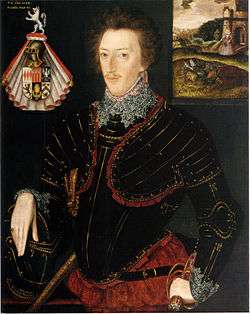Elizabeth Cooke, Lady Russell
Elizabeth Russell, Lady Russell (née Cooke; formerly Hoby; 1528–1609) was an English noblewoman.[1] She was an influential member of Queen Elizabeth I's court and was known in her time for her refined poetry as well as her musical talent.[2] In 1596, she was a vocal opponent of the reconstruction of Blackfriars Theatre in that London district.

Life
She was born at Gidea Hall, Essex, the third daughter of Anthony Cooke, who was tutor to Edward VI. Cooke educated his four daughters to a high level for his day.[3] Elizabeth's sister Anne Bacon became a notable scholar. Elizabeth was proficient in Latin and French.
Elizabeth's first marriage was on 27 June 1558, to Thomas Hoby, of Bisham Abbey, Berkshire, noted as the translator of Baldassare Castiglione's The Book of the Courtier into English.[1] In March 1566 he was knighted and became the English ambassador to France. The couple moved to Paris.[3] Thomas Hoby died there in July. Elizabeth received a touching letter of condolence from Queen Elizabeth I.
Elizabeth had four children by Thomas Hoby: Edward (1560–1617), two girls who both died in childhood in 1571, and then another boy born after her Thomas Hoby's death who was called Thomas Posthumus (1566–1640).[1] She built a memorial chapel to her deceased husband in Bisham parish church in Berkshire.[1]
She was married again in 1574, to John, Lord Russell (d. 1584), eldest surviving son and heir to Francis Russell, 2nd Earl of Bedford.[1] She had two daughters by this second marriage, Anne and Elizabeth. A legend says she also had a son whom she so mistreated because of his obstinance at his lessons and blotting his copy-books that he died as the result of her numerous beatings of him, but this cannot be verified.[4] The legend claims her repentant ghost haunts Bisham Abbey.[1] John Russell's death in 1584, before that of his father, robbed her of the possibility of becoming the countess of Bedford.[1]
Through her connections at court, her brother-in-law was William Cecil, Lord Burghley,[3] and her nephew Robert Cecil,[1] she became involved in litigation and disputes as she sought favours for herself and friends. Her son Thomas Posthumus became Burghley's protégé.[1]
She was for a time favoured by the queen and in the summer of 1592 she entertained the monarch at Bisham Abbey for six days. The Privy Council also met there.[3] The queen was reputedly godmother to two of the queen's children. By 1595 however she found she could only see the queen at church, but by June 1600 she had regained favour when the queen attended her daughter's wedding at Blackfriers.[1]
Elizabeth was known for her patronage of musicians, most notably of the composer John Dowland. She also translated A way of reconciliation touching the true nature and substance of the body and blood of Christ in the sacrament (printed in 1605)[3] from the French and composed tomb inscriptions in Greek, Latin and English.[2] She opposed the reconstruction of the Blackfriars Theatre in 1596, as she did not approve of live theatre, given that she was a devout Puritan. She then drew up a petition against the new theatre. As Chris Laoutaris notes in his description of the neighbourhood conflict, Blackfriars was an "upmarket" district. Some of her petition signatories were business colleagues of Shakespeare himself. Ultimately, her plan failed[5]
By all accounts, Russell also behaved in a similarly fractious manner toward perceived 'rival' property owners in Bedfordshire, who were sometimes kidnapped, hung by their heels, or subjected to document forgery. She seems to have been an ambitious woman, who was zealous in acquiring and protecting her own property, given that she was the first female keeper of her own castle in England [6]
Later in life, she became litigious and pursued grievances in law, not always successfully.[1] Elizabeth died at her house at Bisham, Berkshire, and is buried in the 'Hoby Chapel' at All Saints Church, Bisham, where a magnificent monument was erected to her.
Notes
- Priestland – Oxford Dictionary of National Biography; The first edition of this text is available at Wikisource: . Dictionary of National Biography. London: Smith, Elder & Co. 1885–1900.
- Hays – Female Biography
- Ford – Berkshire History
- For 1873 Doidge's Western Counties Illustrated Annual A Miscellany of Useful, Instructive, & Entertaining Local and General Information
- Chris Laoutaris: Shakespeare and the Countess: The battle that gave birth to the Globe: London: Fig Tree: 2014
- Laoutaris, 2014
References
- Ford, David Nash (2001). "Elizabeth Cooke, Lady Hoby (1528–1609)". Royal Berkshire History-04-24.
- Hays, Mary (1807). Female biography; or, Memoirs of illustrious and celebrated women, of all ages and countries: Alphabetically arranged. Fry and Kammerer. pp. 430–432.
- Zeman Kolkovich, Elizabeth (2009). "English Literary Renaissance 39.2". Lady Russell, Elizabeth I, and Female Political Alliances Through Performance. 39 (2): 290–314. doi:10.1111/j.1475-6757.2009.01048.x..
- Laoutaris, Chris (2014). Shakespeare and the Countess: The battle that gave birth to the Globe. London: Fig Tree. ISBN 978-1905490967.
- Elizabeth Cooke Hoby Russell (2011). Phillippy, Patricia (ed.). The Writings of an English Sappho. Toronto: University of Toronto Press. Retrieved 31 July 2017.
- Priestland, Pamela (September 2004). Oxford Dictionary of National Biography. Oxford University Press. pp. Russell [née Cooke], Elizabeth. Retrieved 31 July 2017. (subscription or free access with a UK library card number)